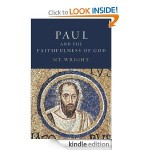One of the major important contentions of Tom Wright is that Israel lived out of, or better said, lived as actors in, the grand story of God and his people, involving both their judgment and their restoration. Tom’s understanding of this fundamental narrative that he believes early Jews not merely resonated with but lived out of has not changed much from twenty years ago until now, to judge from the retelling of the story in Chapter Two, pp. 108ff. Tom still sticks by his contention not only that Jews were living in a ongoing story seeking an ending, so there was a sense of things being unfinished, but he also sticks by the more controversial suggestion that Pharisees and other Jews, even if living in the Holy Land believed they were still in exile awaiting the final promised rescue (p. 114). He things that after the Bar Kokhba revolt, Jews basically gave up the long story with an eschatological future, and exchanged it for individual stories of Torah-true, Law observant Jews.
Before then early Jews like the Pharisees were not primarily interested in developing their own individual piety but rather “They have pulled a book off the shelf called ‘My Life’ only to discover that it is Volume 99 in a hundred volume narrative, and that to make sense of who they are supposed to be they have to recall the entire narrative of the first 98 volumes, and read ahead into number 100 to find out how its all supposed to end.” (p. 116).
In other words, they did not see the Bible as a mere collection of types, shadows, allusions, symbols, examples… though it involved these things. They saw it as the source of their collective story with God. It follows from this that one needed to read the story right. Has Tom read the story of early Jews right by continuing to suggest they saw themselves in exile? For my part I do not think so.
In the first place, the Jewish festivals in the first century A.D. were enormously popular and well attended. Jews, including Jesus, and early Jewish Christians, continued to attend these feasts, worship in the Temple, sing the songs of Zion and so on. This does not sound like the Jews in Babylon saying ‘How can we sing the songs of Zion in a foreign land?’ Secondly, Dom Crossan and others are not correct about the ‘Temple domination system’ and indeed about the ever-present heavy hand of Rome. Ordinary Jews in Judaea and Galilee were not being followed around by Officer Publius. They ran into Romans where they were garrisoned in Caesarea Maritima, or occasionally when they were out on patrol, at border crossings, or very occasionally when it was tax time (though normally it was subordinate agents, often themselves Jews like Matthew who collected the taxes for either the Herods or the procurator or both). Most of the Roman troops in the region were stationed in Syria, not in ordinary cities in Galilee or Judaea.
In other words, if you were an ordinary Jew, not a Zealot or hot head, and not running around trying to bump off Roman soldiers or their auxiliaries, the situation would not have been seen as always ominous, much less an exile situation. When someone comes to your house and takes too much of your money or property to cover the taxes, you may feel like you’ve been robbed, but you don’t feel like you are in exile. You’re at home, but you feel vulnerable in your own home, in your own land. That’s about all.
Clearly, most Jews did not agree with the Qumran community that the Temple system was hopeless corrupt and doomed. It is not a surprise that such a suggestion got Jesus into hot water. It does not appear most Jews thought that way in Jesus’ day, especially not most Pharisees and Sadducees who had much invested in the Temple system (for example the sacrifices were offered according to the stricter Pharisaic rules). Notice how many early Jews were indeed named after the Maccabean war heroes— Simon, Judas etc. The time when they had complete and utter control of their land and Temple was fresh in their memories, and they saw the present difficulties as not preventing them from continuing to focus on Torah, Temple, and Territory.
When one arrives at pp. 139ff. it begins to become clear, as Tom presents yet more grist for his Exile mill, (citing O.H. Steck and Robert Carroll) that what he is basically talking about is the Deuteronomic pattern of sin, judgment (which may or may not involve exile) and finally restoration, with restoration coming after judgment on God’s people. This theme is actually present in a lot of the prophets (see the two volumes by Koch). So, Tom’s main point is that many early Jews saw themselves as under some kind of dark cloud, some kind of judgment, whether it involved actual geographical exile or not, and did not see the present as the full restoration Scripture promised. They were stuck in the middle between sin and restoration.
This makes better sense than continuing to use the word exile to explain the point. Still, it is important not to over-egg the pudding. John the Baptizer and Jesus were both reformers. So were various of the Pharisees. So was the Qumran community. That the reformers saw a great need for repentance and change in the relationship with God is true enough. And many ordinary Jews responded to the call to repent, or become more Torah true etc. Many of them bought the Pharisaic notion of ‘every man a priest’ and living by a modified set of priestly rules. In other words, they either believed something was wrong or in need of improvement, but this does not mean that the majority of them saw the Temple in Jerusalem or the festivals as illegitimate, or saw themselves as in exile. Under some sort of cloud of judgment perhaps, but in exile no.













